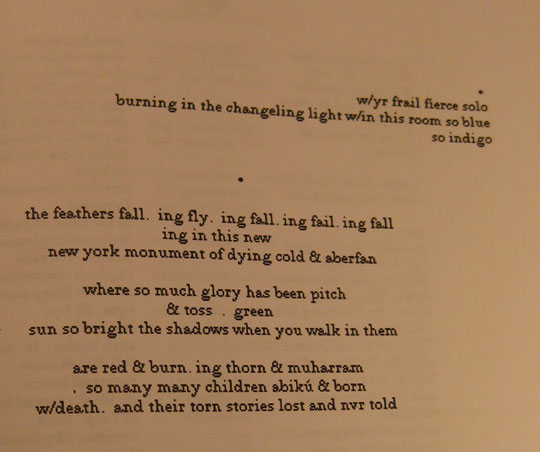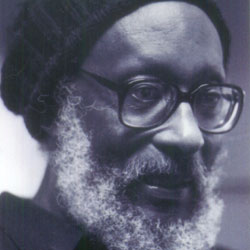.
w/yr frail fierce solo
burning in the changeling light w/in this room so blue
so indigo
.
the feathers fall. ing fly. ing fail. ing fall
ing in this new
new york monument of dying cold & aberfan
where so much glory has been pitch
& toss . green
sun so bright the shadows when you walk in them
are red & burn. ing thorn & muharram
. so many many children abiku & born
w/death. and their torn stories lost and nvr told
.

Notes on the Poem
We previously examined an excerpt of Kamau Brathwaite's poem "Hawk" from his 2006 Griffin Poetry Prize winning collection "Born to Slow Horses". In part, the power of that and many other sections of Kamau Brathwaite's work is achieved through his use of a unique typeface called "Sycorax Video Style", laid out in varied alignments from page to page and poem to poem. The excerpt we're turning to this week is shown both as a picture of the how the poem looks on the page and in a plain text format. Do the words make different impressions in these different forms? What other features invest the words with impact? Other poetic effects and methods do indeed contribute to the impact of Brathwaite's poetry. For example, the partial rhyme used in the opening three lines - "solo" to "so blue" to "so indigo" - imbues the fragment with an echoing, delicate and beautiful melancholy. That melancholy can be associated with so many things, from the personal to the universal. Whether it is the unique typeface of the original or some other text choice, the unusual arrangement of word fragments in the section following the opening lines is striking, both visually and orally. How you read the words "fall. ing fly. ing fail. ing fall ing" either to yourself or aloud is intentionally halting, breaking the words and their meanings apart and reassembling them in emotionally charged fashion. Remembering that this is a portion of a poem devoted to the devastation of the September 11th attacks, what images do the fractured words conjure? Brathwaite adds to this poem fragment's mystique with what might be unfamiliar terms to many readers. Upon further exploration, those terms manage to deepen the emotional heft of the poem, and make other references positively vibrate with additional new meaning and significance. Does "aberfan" refer to this tragic disaster? Is the mention of "muharram" about this occasion for mourning and observing wishes for peace? Learning what abiku signifies lends even more dimensions to what is being mourned in Brathwaite's work.
